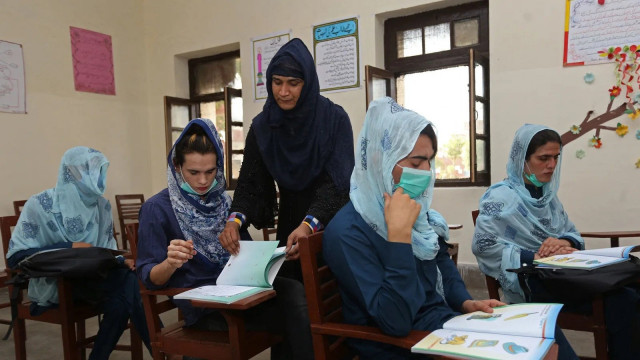Sindh approves Pakistan's first transgender education policy draft
The policy draft will ensure inclusion of a transgender category in school, college admission forms.

Pakistan's first Transgender Education Policy draft has been approved in an important meeting led by Sindh's Education Minister, Syed Sardar Ali Shah.
The policy will ensure the inclusion of a transgender category in school and college admission forms and set a quota for transgender candidates during teacher recruitment.
The meeting, which was attended by various officials, including Sindh Secretary of School Education Zahid Ali Abbasi and Chief Executive Advisor Fauzia Khan, was informed that according to the 2023 national census, there are 20,331 transgender individuals in Pakistan, with 4,222 residing in Sindh.
Representatives from the non-governmental organisation "Charity Trans Action Pakistan" also reported that the actual number could be closer to 250,000, while research by USAID indicated that 42% of transgender people are barely literate, and 40% have no access to education.
The policy draft was developed through consultations with transgender community representatives and aims to address their educational challenges. According to the meeting, the number of transgender people in Sindh stands at 22,065.
Shah acknowledged the various obstacles facing transgender individuals, including social prejudice, abuse, and the lack of access to quality education.
He stressed that the lack of employment opportunities and fear of harassment in educational institutions were additional barriers preventing many from pursuing an education.
"There is no specific curriculum available that addresses the needs of transgender individuals," Shah said. "This policy will help create a supportive environment in schools and establish non-formal education training centres," he added.
Shah highlighted that the policy would focus on the safety, identity, and educational needs of transgender students. Additionally, teachers would receive training to better understand the psychological needs and challenges faced by transgender children.
The policy also includes the introduction of vocational training programmes to equip transgender individuals with employable skills. "It is important that we create an anti-harassment environment in educational institutions," Shah said.
"After the approval of the policy, a public awareness campaign will be launched to highlight the rights and equality of transgender individuals," he added.
The minister also proposed the creation of support groups for transgender students in schools to help them manage social pressures, with mentorship programs where successful transgender individuals could serve as role models to encourage others to pursue education.
With the policy aimed at ensuring equal access to education and ending discrimination, he expressed hope that these initiatives would pave the way for better employment opportunities for transgender individuals.
Shah also suggested discussing with the Benazir Income Support Programme to provide educational resources to low-income transgender individuals.
The policy will be further strengthened once it receives legal approval from the provincial cabinet, after which public campaigns across media platforms will be launched to highlight the importance of transgender education.



1724319076-0/Untitled-design-(5)1724319076-0-208x130.webp)















COMMENTS
Comments are moderated and generally will be posted if they are on-topic and not abusive.
For more information, please see our Comments FAQ